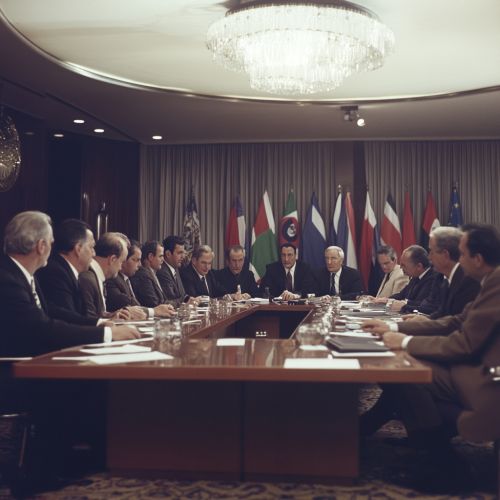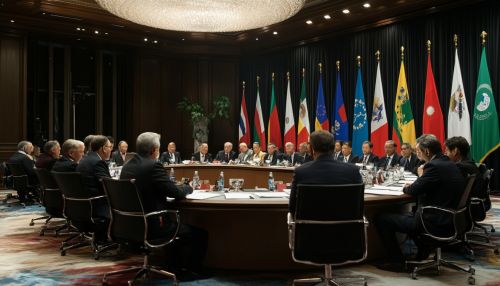Constructivism (international relations)
Introduction
Constructivism in international relations is a theory that emphasizes the social construction of international politics. Unlike traditional theories such as realism and liberalism, which focus on material forces like military power and economic interests, constructivism highlights the role of ideas, beliefs, and identities in shaping international relations. Constructivist scholars argue that the international system is not a given but is constructed through social interactions and shared understandings.
Historical Development
Constructivism emerged as a significant theoretical approach in the late 20th century, challenging the dominance of realism and liberalism. The end of the Cold War, which traditional theories failed to predict, provided fertile ground for constructivist ideas. Key figures in the development of constructivism include Alexander Wendt, Nicholas Onuf, and Peter Katzenstein. Wendt's seminal work, "Social Theory of International Politics," published in 1999, is often considered a foundational text in constructivist theory.
Core Concepts
Social Construction
At the heart of constructivism is the idea that the international system is socially constructed. This means that the structures and actors in international relations are not fixed but are created and maintained through social interactions. For example, the concept of sovereignty is not an inherent quality of states but a social construct that has evolved over time.
Identity and Interests
Constructivists argue that the identities and interests of states are not given but are constructed through social processes. States act based on their identities, which are shaped by historical, cultural, and social contexts. For instance, the identity of a state as a democracy or a theocracy influences its foreign policy and interactions with other states.
Norms and Institutions
Norms, defined as shared expectations about appropriate behavior, play a crucial role in constructivist theory. Norms influence state behavior and contribute to the construction of international institutions. For example, the norm of non-intervention shapes the behavior of states in the international system. Institutions, in turn, are seen as embodiments of these norms and as arenas where social interactions take place.
Methodology
Constructivist research often employs qualitative methods, such as case studies, discourse analysis, and historical analysis. These methods allow scholars to explore the social and ideational dimensions of international relations. Constructivists also emphasize the importance of understanding the meanings and interpretations that actors attach to their actions and the world around them.
Criticisms
Constructivism has faced several criticisms. One major critique is that it lacks predictive power compared to traditional theories like realism and liberalism. Critics argue that constructivism is better suited for explaining past events rather than predicting future outcomes. Additionally, some scholars contend that constructivism's focus on ideas and identities may overlook the material aspects of international relations.
Influence and Applications
Despite these criticisms, constructivism has had a significant impact on the field of international relations. It has influenced the study of various issues, including international security, human rights, and global governance. Constructivist insights have been applied to understand phenomena such as the spread of democracy, the role of international organizations, and the dynamics of regional integration.


Key Scholars
Alexander Wendt
Alexander Wendt is one of the most prominent constructivist scholars. His work emphasizes the importance of social structures and shared understandings in international relations. Wendt's concept of "anarchy is what states make of it" challenges the realist notion that anarchy inherently leads to self-help behavior among states.
Nicholas Onuf
Nicholas Onuf is credited with coining the term "constructivism" in international relations. His work focuses on the role of language and speech acts in constructing social reality. Onuf's book "World of Our Making" is a foundational text that explores the construction of international relations through linguistic and social practices.
Peter Katzenstein
Peter Katzenstein has contributed to the development of constructivist theory through his work on the role of culture and identity in international relations. His research on regionalism and security communities highlights the importance of shared identities and norms in shaping international politics.
Case Studies
The End of the Cold War
The end of the Cold War is often cited as a key case study for constructivist theory. Traditional theories struggled to explain the peaceful resolution of the Cold War, while constructivists highlighted the role of changing identities and ideas. The transformation of Soviet identity and the adoption of new ideas about international cooperation played a crucial role in ending the Cold War.
European Integration
The process of European integration provides another important case study for constructivism. Constructivists argue that the European Union is not merely a product of economic interests but is also shaped by shared identities and norms. The development of a European identity and the establishment of norms of cooperation and integration have been central to the success of the EU.
See Also
References
- Wendt, Alexander. "Social Theory of International Politics." Cambridge University Press, 1999.
- Onuf, Nicholas. "World of Our Making: Rules and Rule in Social Theory and International Relations." University of South Carolina Press, 1989.
- Katzenstein, Peter. "The Culture of National Security: Norms and Identity in World Politics." Columbia University Press, 1996.
